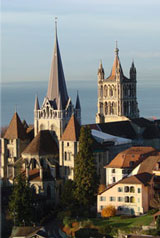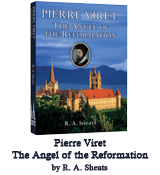What Others Say About Pierre Viret
JOHN CALVIN ON HIS GREAT LOVE FOR VIRET:
It will at least be a testimony to this present age and perhaps to posterity of the holy bond of friendship that unites us. I think there has never been in ordinary life a circle of friends so heartily bound to each other as we have been in our ministry. With both of you I discharged here the office of pastor and so far from there being any appearance of rivalry I always seemed to be of one mind with you. Later we were separated and you, Farel, were called to the church of Neufchatel which you had rescued from papal tyranny and brought to Christ, and you, Viret, stand in the same relationship with the church of Lausanne.
But while each of us keeps to his own post, our union brings together God’s children in Christ’s fold and unites them in His body and at the same time it scatters not only our external enemies who carry on open war against us, but those nearer internal enemies who attack us from within. This also I count among the benefits of our union, that unclean dogs whose bites cannot succeed in tearing and rending the Church only stir it up to no effect by their barking. We cannot hold their influence in too great scorn since we have good reason to glory before God and have the clearest evidence to show to mean that our alliance and friendship have been entirely consecrated to Christ’s name, have hitherto been profitable to His Church, and have no other aim than that all men would be at one with Him. Farewell most excellent and honorable brethren. May the Lord Jesus continue to bless your godly labours.1
JEANNE D’ALBRET ON THE DEATH OF VIRET:
Among the great losses which I have sustained during and since the last war, I place in the forefront the loss of Monsieur Viret.2
J. CART ON THE DEATH OF VIRET:
At the thought of his unknown end, in the land of exile, and of this tomb which we will never see, we confidently repeat the words of Holy Scripture: “Precious in the sight of the LORD is the death of His saints!” (Psalm 116:15) Viret was one of those well-beloved of the Lord, one of those exceptional souls who, after having been vanquished by grace, surrenders their all entirely to their Master, and devotes themselves unreservedly to His service. Love for God—this is the banner of the soldiers of Christ; this is that which, in the day of battle, makes each of them a hero or a martyr.3
PHILIP SCHAFF ON THE FRIENDSHIP OF CALVIN, FAREL, AND VIRET:
[Calvin] availed himself much of the aid of Farel and Viret, while, at the same time, he conferred greater benefits on them. Their friendship and intimacy was not less hateful to the wicked than delightful to all the pious; and, in truth, it was a most pleasing spectacle to see and hear those three distinguished men carrying on the work of God in the Church so harmoniously, with such a variety of gifts. Farel excelled in a certain sublimity of mind, so that nobody could either hear his thunders without trembling, or listen to his most fervent prayers without being almost carried up to heaven. Viret possessed such suavity of eloquence, that his hearers were compelled to hang upon his lips. Calvin filled the mind of the hearers with as many weighty sentiments as he uttered words. I have often thought that a preacher compounded of the three would be absolutely perfect.4
MICHAEL BRUENING ON VIRET’S IMPORTANCE TO CALVIN:
It is difficult to overestimate the importance of Viret’s 1541-1542 stay in Geneva. First of all, Calvin had found the prospect of returning to the city from Strasbourg so abhorrent at first that he likely never would have returned to Geneva if Viret had not been there months beforehand to restore order in the church. Second, Calvin and Viret’s friendship deepened during these ten months together in Geneva to the point where Viret clearly replaced Farel as Calvin’s closest confidant in the following years.5
JEAN-MARC BERTHOUD ON VIRET’S GREATNESS:
I will draw my conclusion from Viret’s own writings. It must, by now, have become abundantly clear to the reader that Pierre Viret can without hesitation, not only be considered one of the greatest (and most ignored) figures in the history of the Reformation, but also of the whole Christian Church.6
BRUENING ON VIRET, GENEVA’S REFORMER:
With Farel, he [Viret] introduced the Reformation to Geneva in the first place. He almost single-handedly set the stage for Calvin’s return from exile. And with Calvin, he created the ecclesiastical ordinances and consistory that would define Reformation Geneva. Indeed, "Calvin’s Geneva" would not have existed as such had it not been for the work of Pierre Viret.7
FAREL ON VIRET’S ACCEPTANCE IN GENEVA:
No church has ever rushed in so eagerly to hear the word of the Lord.8
MICHAEL BRUENING ON VIRET, THE UNKNOWN REFORMER
There is no "Rue Pierre Viret" in Geneva. Viret does not stand next to John Calvin, Guillaume Farel, Theodore Beza, and John Knox in Geneva’s Reformation Monument, but one suspects that had a fifth figure been added, it would have been Viret. Pierre Viret (1511-1571) is best known as the reformer of Lausanne, where he served from 1536 to 1559 during the crucial, formative years of the Reformation in his native Pays de Vaud. His ministry in Lausanne was bracketed and occasionally interrupted, however, by stays in Geneva. Viret’s activity in Geneva, together with his close personal relationship with John Calvin, made him in some ways a minister of Geneva his entire adult life. Indeed, the Reformation in Geneva would not have taken the form that we know it without him.9
PIERRE COURTHIAL ON VIRET’S POWER AND POPULARITY AS A PREACHER:
March 2nd, 1559, Viret started preaching in Geneva where he took up residence. Men hastened to listen to him, to such a degree because his sermons, applying faithfully the Scriptural text, were both personal and popular.10
JACQUES BERNARD WRITES TO CALVIN OF VIRET:
Do not put off coming to see Geneva, that is, a new people, clearly restored (thanks be to God) by the work of Pierre Viret.11
JOHN MCCLINTOCK AND JAMES STRONG ON VIRET’S CHRISTIAN CHARACTER:
He was brave and true in his adhesion to the evangelical Church, but nevertheless of a mild and peaceful temper. He did not develop the prevalent theology, but merely made it accessible to laymen and defended it against opponents. His works rank among the greatest rarities in literature.12
JEAN-MARC BERTHOUD ON VIRET’S CHRISTIAN CHARACTER:
. . . this mild and gentle Christian, a man of the highest spiritual mettle, was also one of the great preachers of the Reformation. Of Calvin Beze wrote, "None have taught with greater authority," of Farel, "None thundered more mightily," but of Viret he said, "None has a more winsome charm when he speaks.13
THEODORE DE BEZE ON VIRET’S CHARACTER:
Seeing this body subdued by suffering, by poison
By wounds, by labor, by age, by abstinence,
The virtue of the Lord I adore in great silence
And to his noble secrets I subject my reason.
Reading the sublime writings that in that prison,
Viret, you prepared, witnesses of your science,
Of your earnest judgement, and of your conscience,
Truly I see that God resides in His house.14
D’AUBIGNE ON VIRET’S CHARACTER:
Viret ‘had a wondrously meek temper.’ There was in him a grace that won the heart, and a Christian sensibility that was really touching; and yet, like Farel and Calvin, he was firm in doctrine and morals.15
WILLISTON WALKER ON VIRET’S CHARACTER:
. . .Pierre Viret, a Swiss of Orbe, of slender figure and low stature, now not quite twenty-three years of age, but already widely-known no less for his skill as a preacher than for his sweetness of temper and personal modesty.16
JOHN CALVIN ON VIRET’S FRIENDSHIP:
[Calvin] shared his mind and feelings most intimately with Farel and Viret, and he dedicated his Commentary on Titus to them. "I think there has never been in ordinary life a circle of friends so heartily bound to each other as we have in our ministry.17
FELIX BUNGENER ON VIRET’S CHRISTIAN CHARACTER:
In 1540 the Genevese magistrates sent envoys to the exiled Calvin, begging him to return to Geneva. Calvin, hearing that Viret was already at Geneva, replied, "Master Pierre Viret is of so much prudence and fidelity, that, having him, you are not destitute.18
JEAN-MARC BERTHOUD ON VIRET’S APOLOGETICS:
If his good friend, John Calvin, was the consummate dogmatician and the prince of exegetes, Pierre Viret must be considered as the finest ethicist and the most acute apologist of the sixteenth century. His monumental Christian Instruction in the Doctrine of the Law and the Gospel and in True Christian Philosophy and Theology, both Natural and Supernatural is without doubt his major theological work and can well bear comparison, in its own domain, with Calvin’s Institutes. . . . [Christian Instruction] constitute[s] a complete treatise on the detailed application of the Ten Commandments to every aspect of reality. It is the finest exposition of the law of God that it has been my privilege to read. The only work I know which in any way bears comparison to this masterpiece is Rushdoony’s The Institutes of Biblical Law. Not only do we find there a detailed application of God’s word to the practical problems of Christian living in every aspect of personal and social life, but this is done with an admirable sense of theological balance and of the delicate relation of dogmatics to ethics, together with the constant, implicit purpose of favoring the preaching of the gospel, of extending God’s kingdom, and of bringing all honor and praise to the Lord Jesus Christ.19
HENRI VUILLUEMIER ON THE COMPANIONSHIP OF FAREL AND VIRET
Apart from an absence of a few weeks, passed among his parishioners of Neuchatel, Viret for the time, during more than a year, was Farel’s indefatigable help [in Geneva], sharing in the fatigues and perils of his ministry in a city which, more than any other in those times, was a true war zone. By the diversity of their gifts and characters, the two champions were made to complete each other. And the youngest of the two was by no means the least loved, nor the least dreaded by others.20
MEGANDER WRITES CONCERNING VIRET’S DEBUT AT LAUSANNE
At Lausanne Christ is announced freely by a young man as learned as he is pious, and this before a very numerous assembly.21
HENRI VUILLEUMIER ON VIRET’S WORK AT LAUSANNE
His pastoral work at Lausanne would continue for more than twenty years, more than a third of his entire career. This long ministry can well be characterized in saying, in the language of an apostle, that he was rendered commendable, as a good servant of God, by a great patience in afflictions, work, and watching; by purity, knowledge, kindness, a word imprinted with truth; renowned among good and evil.22
THEODORE DE BEZE ON VIRET’S GENTLENESS
France still admires Viret diffusing a honeyed water, for no person ever proclaimed his faith with such gentleness.
D’AUBIGNE ON VIRET’S LEARNING AND ELOQUENCE:
He preached: his sermon was accompanied by so much unction and learning, his language was so persuasive, his eloquence so searching and penetrating, that even the most worldly men were attracted by his discourse and hung, as it were, upon his lips. The proverb ‘No man is a prophet in his own country’ was not exemplified in Viret’s case. The 6th of May [the day of Viret’s first sermon] was a great day for him. All his life through he preserved the recollection of his first sermons. Thirty years later he said to the nobles and burgesses of Orbe: ‘Your church was the first in which God was pleased to make use of my ministry, when it was still in its youth, and I was very young.’ 23
VIRET: THE PEOPLE’S PREACHER AND WRITER
He was a prolific writer, a noted teacher, a popular preacher and a gifted evangelist. Probably more of the common people of France and Switzerland listened to Viret preach than heard either Calvin or Beza. Also, Viret wrote nearly all of his books and pamphlets for popular consumption rather than for the more limited reading public to whom most of the other Calvinist authors addressed themselves, namely, the intellectual class and ecclesiastical divines.24
VIRET THE PASTOR
Speaking of Viret in his conclusion, Barnaud states: ‘At the side of Farel, the missionary par excellence, and Calvin, the theologian, he is the pastor, in the most complete and extensive sense of that term.’ 25
JEAN BARNAUD ON VIRET’S ORATORY:
His speech was so sweet that he would continually hold the attention and the interest of those who heard him. His style, which married strength to harmony, was so caressing to the ear and to the intelligence that even those of his hearers least interested in religious matters, those most impatient of other preachers, would hear him out without difficulty and even with pleasure.26
ROBERT LINDER ON VIRET’S INFLUENCE:
Viret deserves a far more prominent place in the story of the Reformation than he has been accorded thus far, especially by historians in the English-speaking world.27
JEAN BARNARD ON VIRET’S EVANGELISM:
In Lyon, preaching out in the open, he brought thousands to saving faith in Jesus Christ. By the power of his divine eloquence he would even cause those passing by to stop, listen and hear him out.28
C. G. MCCRIE ON VIRET’S EVANGELISM:
All over the South of France [Viret] preached to audiences of thousands, and a tradition of the eloquent evangelist haunts some of these places to this day.29
ROBERT LINDER ON VIRET’S POPULARITY AS WRITER AND SPEAKER:
Viret was a close personal friend and trusted associate of both Calvin and Guillaume Farel. Furthermore, for many years he enjoyed a close relationship with Beza, first at Lausanne, and later at Geneva. Unfortunately, Viret heretofore has not received the attention that he deserves from Reformation scholars and, even though more important and influential than Farel, he is probably less known in the English-speaking world. Viret was a prolific writer, a noted teacher, and a widely acclaimed preacher in his day. He wrote for the general reader of the literate public, and he preached to the masses wherever he found them. His life and thought are very important, for with his popular style he reached and influenced not only the leaders of French Calvinism but also tens of thousands of the rank-and-file of the reformed faith.30
ROBERT LINDER ON VIRET’S PEACE-MAKING SKILLS:
Viret was called to Geneva twice in 1546 to act as a mediator in two different conflicts. . . . These were not the only examples of the great demand for Viret as a mediator and his reputation as a man of moderation. He was called to Geneva on other occasions, and to other cities and churches as well. He made several trips to Neuchatel in order to settle serious squabbles there between the city government and his venerable friend Farel. He mediated and tempered a hot dispute between the Zwinglians and Lutherans in the Pays de Vaud in 1545, and managed to bring about a rather stable settlement between the two factions. In 1549, he played an important part in negotiating the Consensus Tigurinus and in persuading the Reformed church of the Pays de Vaud to accept it. Viret’s capabilities as an arbitrator of disputes were widely recognized and many Protestant groups utilized his mediatorial services. . .31
Back to top of page



